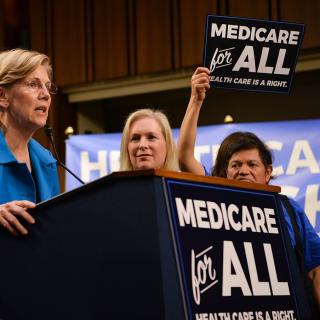Advertisement
Ain't No Love In The Heart
It's May Day and I'm supposed to be inspiring. Revolution for the equilibrium. That was my goal when I started at this fine publication, and today would be the day to do it. May Day, the anarchist Super Bowl, a day home to more than a few massacres. The world's favorite day for militant demonstrations, though near as I can tell, the only march in Columbus today is about raising the minimum wage. “Give Ohio a Raise,” that is literally the rhetoric that Obeezy used in the State of the Union. The Democrats' game is it's a way to wrest control of the narrative leading up to the midterms away from the ACA, which is to say that after November, all this magical DCCC-lead concern for economic justice will magically vanish.
Which almost illustrates my point for me: recently I've been feeling despondency in even engaging in politics, which is a counter-revolutionary impulse, especially when we in the seat of the global hegemon. America is one big gated community, with all attendant Trayvon Martins and George Zimmermans. What I think I'm trying to do with this modest column is fuck shit up at the HOA meeting. But fucking shit up is not an easy, or even enjoyable process, all Steve Jobs graduation speeches notwithstanding.
That impulse, to proceed when every ounce of your being tells you to turn back, is called courage by most, manliness by the more patriarchal among us. For some, those feelings are weakness, they must be crushed. But for me, they speak to the very meaning of the word “violence,” specifically, that violence violates. That far from our Hobbesian proclamations, the state of nature, the natural order, is actually one of peace.
And indeed, there's a reason fighting wars is a young man's game. Even at 25, I have much less of a taste for engaging in the actual revolutionary politics that I ascribe to, even compared to two years ago. This isn't some Winston Churchill “if you haven't turned establishment by 30, you have no head” mess.
As I've grown older, my political analysis has only grown more radical. Naw, the hesitation I feel more and more is one that has to do with the nature of politics itself.
Politics is not a game of Pareto improvement, fundamentally politics is about power, about winners and losers, and even in radical politics, it's about picking who benefits from policies and who suffers. If you're on the right (and this is the most charitable explanation I can come up with), it's about rewarding the good and punishing the bad. For the left, it's about helping the marginalized and equalizing the powerful. Inasmuch as you or anyone engages in politics, to be real with it, it's about riding for your people and picking out who you think is the deserving “other” to get punished.
I have a lot of really good theories, about white supremacy, about capitalism, about patriarchy, about private property. I let these theories inform my actions because I believe that destroying these concepts is necessary for a just, loving world. Or, put in a less inspiring fashion, that all the violence in the world can be explained through one of four or five concepts. But what if the Hobbesians are right? What if the violence of the world is more or less random, a condition of existence itself? That violence isn't a violation of the natural order, but in fact the natural order itself?
One of the things I've reliably found in radical leftist circles is that a group of us are dealing with mental health issues. Makes sense to me, because how does one not go crazy understanding the world around them whilst carrying the expectation to exhibit a Pharellian sense of happiness in your public dealings.
At this point, it's probably safe to say I have undiagnosed depression. The abyss has been gazing back into me off and on since I was 13, but the reasons I refuse to get so-called treatment are twofold: One, like hell, my problems can just be solved by some of Pfizer's intellectual property. The second is that I've been in healthy communities, and in those communities, in places were everyone can just be without apology, without shame, those destructive thoughts go away.
Almost all of our laws, our concepts of “civilization” are predicated on the the idea that people can't be trusted, that we need external restrictions that suppress our destructive anti-social thoughts in order for us to live peacefully, but in my time in loving communities, those thoughts never even materialize.
It's fundamentally beyond your conception as to why you would ever do anything to hurt these people.
Perhaps related to this shared malady, is that our movements are anti-everything. This is not a good look. Negativity doesn't attract people. Movement participant as tortured artist is not functional, and more importantly it doesn't practice solidarity. But there are reasons beyond the dangers of ideology that anti-everything is a better stance than one might think. Because, when you strip away all of the structures, all you're left with is humanity, a full robust unequivocal defense of humanity, and a full robust unequivocal defense of humanity truly is the only reason to ever engage in politics, and also why the only worthwhile politics are those of a radical nature.
The true goal of radical politics is making radical ideas seem normal. The radical project then is to put the humanity of all 7 billion people in this world as first priority. This project necessitates bringing down oppressive structures, but equally as important is not putting one's faith in some grand new theory of development, equally as important is putting one's faith in nothing but humanity.
Loving, healthy natural communities that don't other-ize anyone and can still provide clean water, internet access and cinnamon rolls, for everyone in the world, as a political vision. Does it sound crazy?
No it doesn't. What you're hearing is the insanity of the system before us. What it sounds like is what we all intuitively want. How do we get there? By being honest with each other, no Leviathan needed.
I'm not sure if I'm being very inspiring at this point, but it does feel like sentiment that belongs in the equilibrium.



